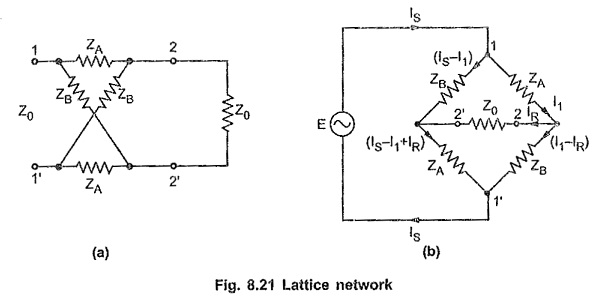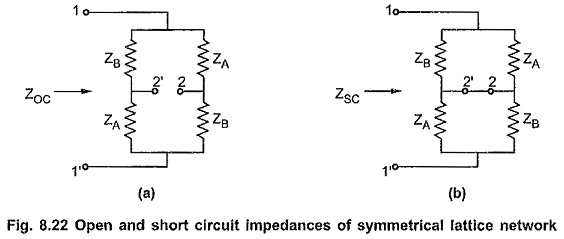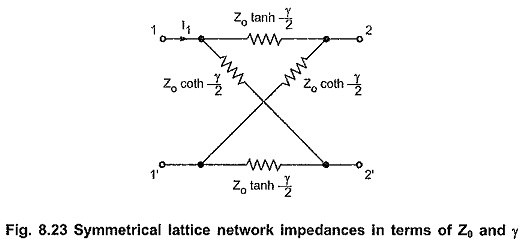Lattice Network in Network Analysis:
The Lattice Network in Network Analysis is a symmetrical and balanced with four arms as shown in the Fig. 8.21 (a). The arms consisting impedance ZA are called series arms of the lattice network. The arms consisting impedance ZB are called shunt or diagonal arms. The lattice network can be rearranged in the bridge structure as shown in the Fig. 8.21 (b) which is very suitable for the analysis of the lattice network.
As lattice network is a symmetrical network, let us derive expressions for the characteristic impedance (Z0) and propagation constant (γ). It is very convenient to use bridge structure of the lattice network for the calculation of propagation constant.
Characteristic Impedance (Z0):
Consider Fig. 8.21 (b).
Consider closed path 1-2-2′-1′-1, applying KVL, we get
Consider closed path 1-2′-2-1′-1, applying KVL, we get
From equation (1),
From equation (2),
Equating equations (3) and (4),
But by the property of symmetrical network, the input impedance of the network terminated in its characteristic impedance is equal to Z0.
Let
Putting value of E/Is in above equation,
(B) In terms of open and short circuit impedances
For the calculation of open and short circuit impedances arranging bridge structure of the lattice network as shown in the Fig. 8.22 (a) and (b).
Consider Fig. 8.22 (a),
Consider Fig. 8.22 (b),
Multiplying equations (6) and (7) , we can write,
Propagation Constant (γ):
For any symmetrical network, propagation constant can be expressed as,
Consider equations for current IR given by equation (3) and (4) derived in section 8.6.1.
But we know that E = Is . Z0
Impedances ZA and ZB in terms of characteristic impedance (Z0) and propagation constant (γ)
Consider equation,
Similarly,
Hence lattice network with impedances expressed in terms of characteristic impedance and propagation constant is as shown in the Fig. 8.23.
After detail analysis of some of the important symmetrical networks now consider analysis of typical asymmetrical networks.
















